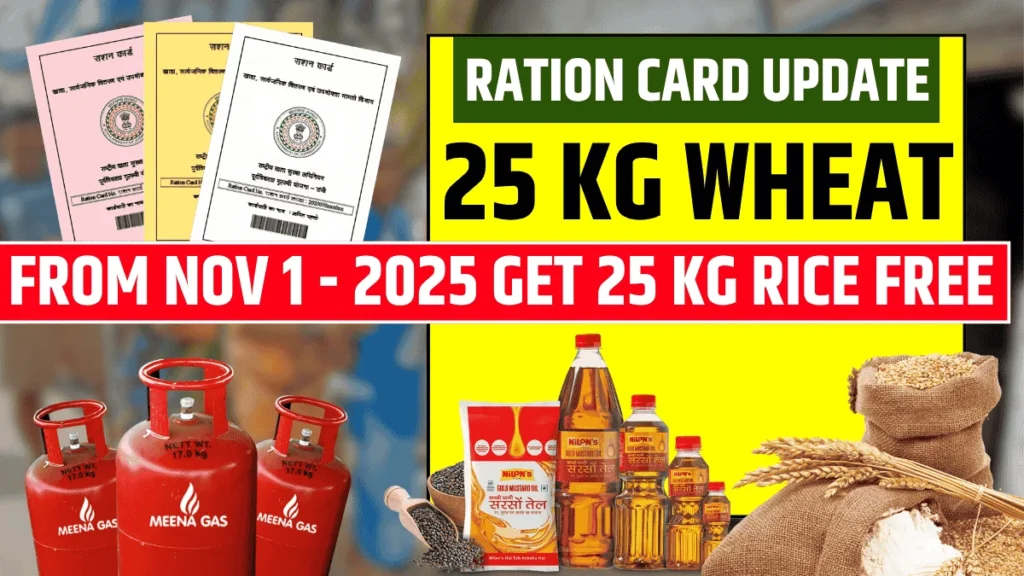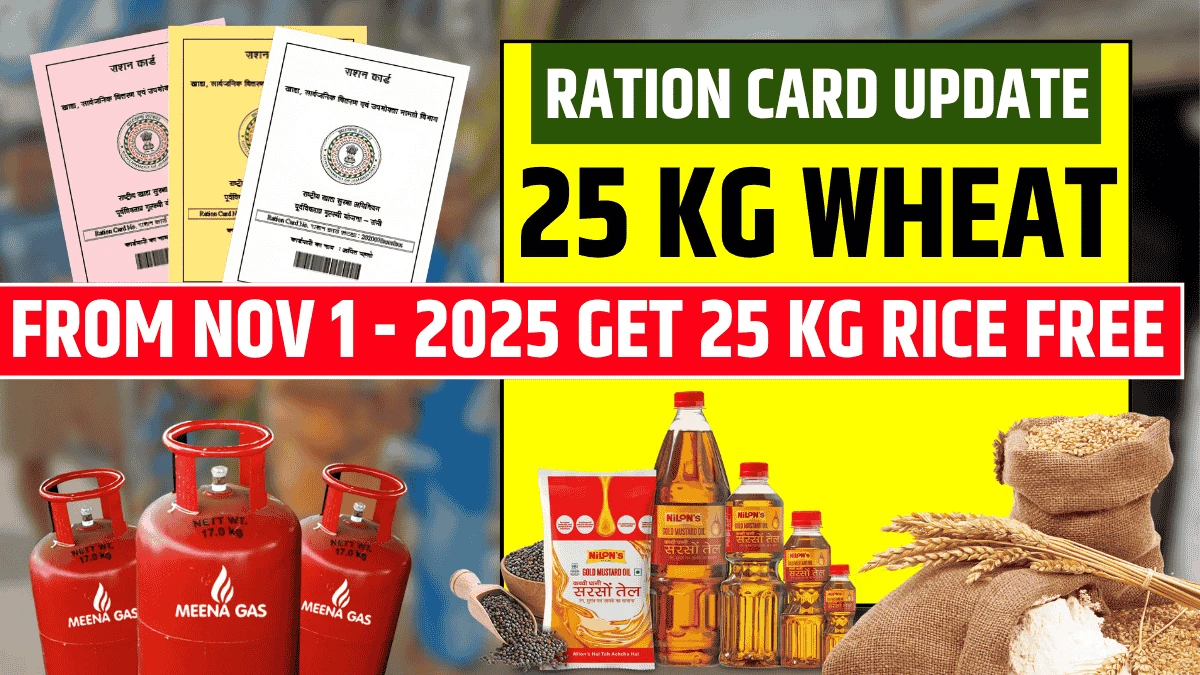Starting November 1, eligible ration card holders are set to receive an expanded free grain basket consisting of 25 kg wheat and 25 kg rice, supplied through their designated Fair Price Shop. This move, notified in various jurisdictions, aims to cushion household budgets during the festive and early winter months. While the exact contours can vary by state and beneficiary category, the core intent is consistent: ensure adequate grain availability at zero cost, improve access for migrant families, and tighten transparency so that every entitled household actually receives the full quantity allotted to it.

What you will get
Under the new window, families where this update is notified can lift 25 kg of wheat and 25 kg of rice for free. In many locations, the grain may be issued in five or ten kilogram sealed bags, with weights recorded digitally at the electronic Point of Sale device. Some states may permit limited substitution based on local diets, such as swapping part of wheat for additional rice or coarse grains where stocks permit. Always check the printed receipt to confirm item names, quantities, the shop ID, and a zero-price entry for each line item.
Who is eligible now
Eligibility remains anchored to NFSA categories such as Antyodaya Anna Yojana and Priority Household cardholders, with local rules determining exactly how much each household receives. In several places, the 25 kg wheat plus 25 kg rice bundle is prioritised for the most vulnerable households, while others may receive a proportional allocation. Ensure your ration card is active, Aadhaar is seeded where required, and your mobile number is updated to receive entitlement messages. Newly added family members typically need eKYC completion before they appear on shop devices.
Free grain entitlement doubled
For many families, this update functions as a top-up over the standard monthly entitlement, effectively doubling what they can bring home during the rollout month. The goal is to offset food price pressures and seasonal expenses so staples are not compromised. If your household previously lifted only the per-person quota, you may now see a consolidated household-level bundle. The shop’s ePoS screen should show the updated entitlement in real time. If you see a shortfall, request the shopkeeper to refresh the device and reauthenticate your transaction.
Zero price to continue
The grains issued under this update carry a zero price tag for eligible beneficiaries. No service fee, transport charge, or “rounding difference” should be demanded by the shop. Your printed receipt must state the total amount due as zero and reflect the exact weight you collected. If you are asked for money, keep the receipt, note the date and time, and escalate the matter through your district food supply office or the toll-free grievance channel printed on your ration card. Zero-cost distribution is a core condition and is strictly enforceable.
Portability support for migrants
One Nation One Ration Card continues to support portability so migrants can lift entitlements outside their home district or state. In practice, portability for special top-ups can differ by circular, so ask the shop or check your state’s notice to confirm whether the entire 25 kg wheat and 25 kg rice can be lifted at your current location. Many families split entitlements, with part collected by the migrant member and the balance by those at the home address. Coordination with family members and timely verification helps ensure nothing lapses at month’s end.
Digital checks made mandatory
Expect biometric authentication through Aadhaar on the shop device, with an OTP fallback if fingerprints are difficult to read. Senior citizens or workers with worn fingerprints can use the OTP method linked to their registered mobile. If neither method works, the shop should flag an exception mechanism as per local rules so genuine beneficiaries are not denied food. Every completed transaction generates a digital footprint and a printed receipt, adding transparency and enabling audits. Keep your slip safe until you have checked the quantities at home.
Complaint channels strengthened now
Alongside the expanded entitlement, grievance handling has been reinforced in many places. Each Fair Price Shop maintains a complaint register and displays contact details of the local supply officer. District-level control rooms track stock flows and beneficiary complaints, and surprise inspections are more frequent during large distributions. If you face stockouts, overcharging, short weighing, or denial of service, record the shop code from your receipt and raise it immediately. Timely reporting helps the administration recover dues and deters repeat violations.
Monthly pickup window details
Distribution typically follows a fixed monthly window with daily time slots announced at the shop and through SMS alerts. Arriving early in the cycle reduces the risk of temporary stockouts during peak hours. If you miss a scheduled day due to work, check the shop notice for alternative slots, including evening hours in busy localities. Some states allow flexible pickup across the first and second halves of the month, but top-up windows can be shorter. Verify dates beforehand so your entitlement does not expire unclaimed.
Required documents and deadlines
Carry your ration card, Aadhaar for the member authenticating the pickup, and a registered mobile phone if OTP verification becomes necessary. If your mobile number has changed, ask the shop or the local office about updating records before your next visit. Households awaiting card updates for newborns, marriages, or address changes should complete eKYC promptly, as unseeded members often do not reflect in the device. Deadlines for eKYC or linking updates are usually printed in the latest circulars at the shop counter.
Quality and storage tips
Examine grains at the counter for uniform color, minimal broken kernels, and absence of infestation. If you notice quality issues, raise them before you sign or press confirm on the device. At home, store wheat and rice in dry, airtight bins elevated off the floor to prevent moisture seepage. Use clean containers with tight lids, and consider sunning the bins before refilling to remove residual dampness. Label older stock and consume it first, rotating fresh bags behind existing supplies to maintain quality across the month.
State wise variation notes
Implementation details vary across states and even between districts. Some locations may offer the full 25 kg wheat and 25 kg rice to Antyodaya households and a calibrated amount to Priority households. Others may substitute part of wheat with rice or coarse grains based on availability and local preferences. A few states add fortified or millets options where supply chains support them. Always treat the displayed entitlement on the shop’s device and your printed receipt as the final authority for that month in your area.
Common questions answered here
If your fingerprint fails, request OTP verification or the designated exception process, which often includes alternative ID checks. If stocks appear low on a given day, the shop should announce a replenishment time and honor your entitlement within the window. If you travelled and could not collect, ask whether late pickup is permitted before the month closes. If your household is split across locations, plan who will lift what to avoid partial expiries. Keep every receipt until you confirm that weights and items match your entitlement.
Final reminders and tips
Plan your visit early in the window, bring the right documents, and verify that your receipt shows zero price and correct quantities. Do not accept less than what the device shows, and request the shop to reweigh if the bags look underfilled. Encourage family members to complete eKYC so no entitlement remains stuck in the system. Finally, check the notice board at your Fair Price Shop each month, as any updates to dates, quantities, or verification methods are posted there first and apply immediately from the stated effective date.
Disclaimer
This article is for general information only and is not an official government communication. Program rules, dates, and quantities may change without notice and can vary by state, district, and beneficiary category under the National Food Security Act. Eligibility and entitlements depend on current circulars, Aadhaar/eKYC status, local stock availability, and records shown on the Fair Price Shop device and receipt.
